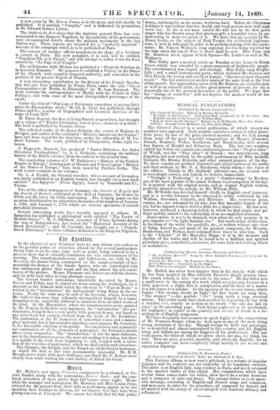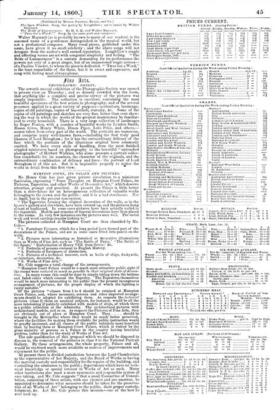MUSICAL PUBLICATIONS.
[Published by Messrs. Cocxs and Co.] The Classical Pianist. Edited by Brinley Richards. "Twilight is Darkening." Schlummerlied, composed by F. Kucken. The English version of the words by William Hills. "Lay me down by the Stream." Ballad, by J.!:41.1klurdie, Mug. Bac. Gaon. Juliette. Grande Valse Brillante, by 3Iarcellus Higgs.
The Classical Pianist is a serial publication, of which twenty-six numbers have appeared. Each number contains a sonata, or other piano- forte piece, by one of the great classical masters ; and we find among them some of the most beautiful compositions of Mozart, Clementi, Dussek, Hummel, Weber Beethoven, and Mendelssohn, with several fine fugues of Handel arid Sebastian Bach. The last two numbers (which are before us) contain two celebrated pieces—the "Ne plus ultra" of Woelfl, and the "Plus ultra" of Dussek ; two masterpieces, long forgotten, but now revived by the public performances of Miss Arabella Goddard, dlr. Brinley Richards, and other eminent pianists of the day. To these sonatas are prefixed historical and critical notices of the works and their authors, by Mr. G. A. Macfarren, which enhance the value of the edition. Thanks to Mr. Richards' editorial care the musical text ' is exceedingly correct, and indeed, we believe immaculate.
"Twilight is Darkening" is a pretty "slumber-song," by Kucken, one of the most popular of the minor German vocal composers of the day. It is printed with the original words, and an elegant English version, perfectly adapted to the melody, by Mr. William Hills. Mr. M'Alurdie has devoted himself chiefly to English vocal harmony, and is a worthy labourer in the vineyard so richly cultivated by our Webbes' Stevenses Callcotts, and Horsleys. His numerous glees, canons, ere., are esteemed by all who love that beautiful branch of the art, but he appears to have written little for a single voice. He has now, however, produced a charming ballad, in which we find simple and pa- thetic melody united to the scholarship of an accomplished musician. Dance-music is not to be despised, even when its only purpose 18 to give impulse to "the light fantastic toe." But much music of this class, in the form of the waltz, the quadrille, ere., is written without any view of being danced to, and many of the greatest composers, the Mozarts, Beethovens and Webers, have indulged their fancy in this way. Such is the "Juliette" of Mr. Mareellus Higgs : it is in the measure and rhythm of the waltz, and will be found to be a brilliant and spirited pianoforte piece, remarkable, moreover, for some bold and striking effects of modulation.
[Published by Messrs. ADDISON, HOUSER, and Ltcas.]
" Oh, doubting Heart!" Song, by Miss Adelaide Procter ; set to music by John Hullah.
Song of the Surricor. By Francesco Berger. Lore's Messenger. Canzonet, by the Same. Still Waters run deepest. Balled, by the Same.
Mr. Hullah has never been happier than in the melody with which he has been inspired by Miss Adelaide Procter's deeply pensive lines. The sound, indeed, is here "an echo to the sense." He has fallen into a small error in the setting of a word, which we point out, because in a little gem even a slight flaw is conspicuous, and the fault of a matter is a bad lesson to a scholar. In the opening of the second stanza, which begins "The stormy clouds on high," the first words are sung thus, "The storml " ;—the particle "the" being made a long, accented minim. This could easily have been avoided by beginning the bar with a crotchet reef, exactly as is done at the words "the sun has hid its rays," on the preceding page. Such things ought not to be overlooked, for negligence in regard to the quantity and accent of words is a be- setting sin sin of English composers. We have frequently had occasion to speak highly of the compositions of Mr. Franceso Berger, whom we look upon as one of the most rising young musicians of the day. Though foreign by birth and parentage, he is domiciled and almost naturalized in this country, and his English songs and ballads are among the happiest of his productions. His last Toed pieces, the titles of which are given above are also, we think, his best. They are pure, graceful, masterly, and, above all, English ; for no native composer can more completely adapt melody to the accent and expression of poetry.
[Published by M. RICHAULT, Paris.] Le Sourenir Musical de Beanie Edite par Abelinde S. E. Rae.
This Parisian Album, or new year's gift-book, is a volume of singular elegance, and its contents are not unworthy of its handsome exterior. The editor is an English lady, long resident in Paris, and much esteemed in the musical circles of that capital. Her compositions, which have several times comes under our notice, show her to be a sound musician and a composer of taste and fancy. The volume before us is an agree- able mélange, consisting of English and French songs and romances, and morceaux de salon for the pianoforte, all composed by herself, and all marked with the stamp of talent mingled with feminine delicacy and refinement.
(Published by Messrs. CO.Amse, BEALE, and Co.]
The Open Window. Song, the poetry by Longfellow ; set to music by Walter Maynard. The Bride of Lammermoor. By H. S. H. and Walter Maynard. "Toms but a Word!" Song, by the same poet and composer.
Walter Maynard (as is probably known to many of our readers) is the assumed name of a gentleman distinguished in the musical world, but not a professional composer. Many vocal pieces, published under this name, have given it no small celebrity ; and the above songs will not derogate from the author's well earned reputation. Longfellow's simple and affecting verses are set with congenial simplicity and feeling. "The Bride of Lammermoor" is a cantata demanding for its performance the powers not only of a great singer, but of an impassioned tragic actress- of a Pauline Viardot, to whom the piece is dedicated. " 'Twas but a Word," is the least remarkable of the three, but it is sweet and expressive, and sung vrith feeling must always please.



























 Previous page
Previous page